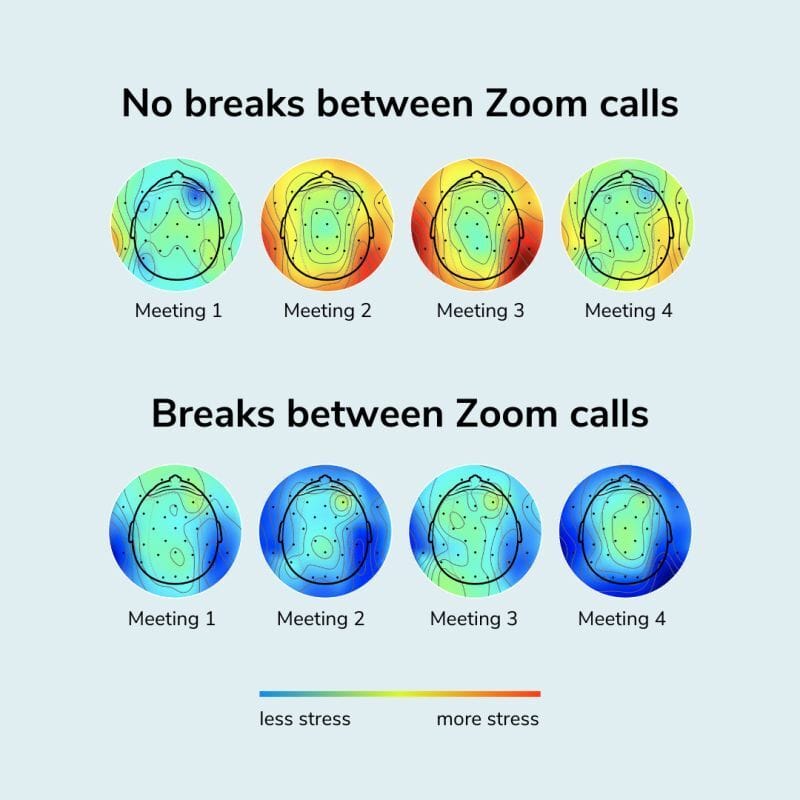- Live Leaner
- Posts
- Back-to-Back meetings at work? Don’t skip this
Back-to-Back meetings at work? Don’t skip this
Plus, a 3-step method to reset your brain
Hola amigos,
No “Happy New Year” fluff here. Every day is a chance to improve, no matter if it’s June 16th or January 1st.
Small steps compound, and being 1% better every day is the key to success. Today, we’re diving into how you can reset your brain and take control of your cognitive health.
Back-to-back meetings aren’t just exhausting—they actively harm your brain’s ability to focus, stay productive, and support long-term health.
Your Brain on Back-to-Back Meetings: What Science Tells Us
Microsoft’s Human Factors Lab conducted a groundbreaking study with 14 participants.
Two scenarios were tested:
1️⃣ Non-stop meetings: Four consecutive 30-minute sessions without breaks.
2️⃣ Meetings with 10-minute breaks: The same schedule, but with breaks in between.
Key Findings:
Without breaks: Stress levels surged during transitions between meetings, shown by spikes in beta wave activity. Over time, focus and engagement plummeted.
With breaks: Calm and engagement improved as participants displayed stronger frontal alpha activity, which is linked to mental clarity and stress reduction.

Exciting Announcement
This Friday, I’m introducing something entirely new: an exclusive opportunity for 3 executives to start 2025 at the top of their health with my high-performance program, Live Leaner.
This program is designed to help you work smarter, not harder, and achieve lasting results. It’s a limited chance I’ve never offered before, and I can’t wait to share it with you. Register your interest here.
Here are 3 evidence-backed micro-interventions to reset your brain and thrive:
Brain health isn’t just about avoiding disease—it’s about using proactive strategies to reduce daily stress and improve long-term cognitive resilience.
1. Neck Stretch with Sternum Anchor (1 Minute)
How:
Place one hand on your sternum.
Tilt your head back.
Hold for 10 seconds, and repeat.

Why It Works:
Boosts blood flow to the brain, helping clear stress-related toxins.
Releases tension in the neck and shoulders, common areas for stress buildup during meetings.
Supports better focus by reducing cortisol’s grip on your body.
2. Four-Seven-Eight Breathing (2 Minutes)
How:
Inhale deeply for 4 seconds.
Hold your breath for 7 seconds.
Exhale slowly for 8 seconds. Repeat 4-5 times.

Why It Works:
Activates the parasympathetic nervous system, putting your body into “rest and digest” mode.
Reduces cortisol and heart rate variability (HRV), essential for managing stress.
3. Three Hundred Steps + Posture Reset (3 Minutes)
How:
Take a brisk 3-minute walk at 100 steps per minute.
Focus on posture: roll your shoulders back, keep your core engaged, and turn your thumbs outward slightly to open your chest.

Small Habits, Big Changes (Screenshot This!)
Why It Works:
Walking improves insulin sensitivity and metabolic flexibility, foundational to preventing long-term cognitive decline.
Correcting posture alleviates strain caused by prolonged sitting, reducing cortisol buildup.
TL;DR:
The stress from back-to-back meetings doesn’t just fade away—it compounds, increasing your risk of cognitive fatigue and burnout.
These simple 3 steps, rooted in cutting-edge science and longevity insights, can reset your brain, improve focus, and help you build resilience for 2025. Try them today.
Your 2025 self will thank you!
Having said that—see you next year!
(Obviously, I had to crack that joke, right?)

This could be you by the end of Q1 2025! Keep reading!
PS. Exciting Announcement
This Friday, I’m introducing something entirely new: an exclusive opportunity for 3 executives to start 2025 at the top of their health with my high-performance program, Live Leaner.
Register your interest here [Available only for 3 executives until April 2025]
Below, you’ll find a video introducing the podcast I’m launching alongside the program. Stay tuned for all the exciting details!
This Friday, I’ll reveal the details of The Live Leaner Program and why it’s something that has never been offered before.
Reply